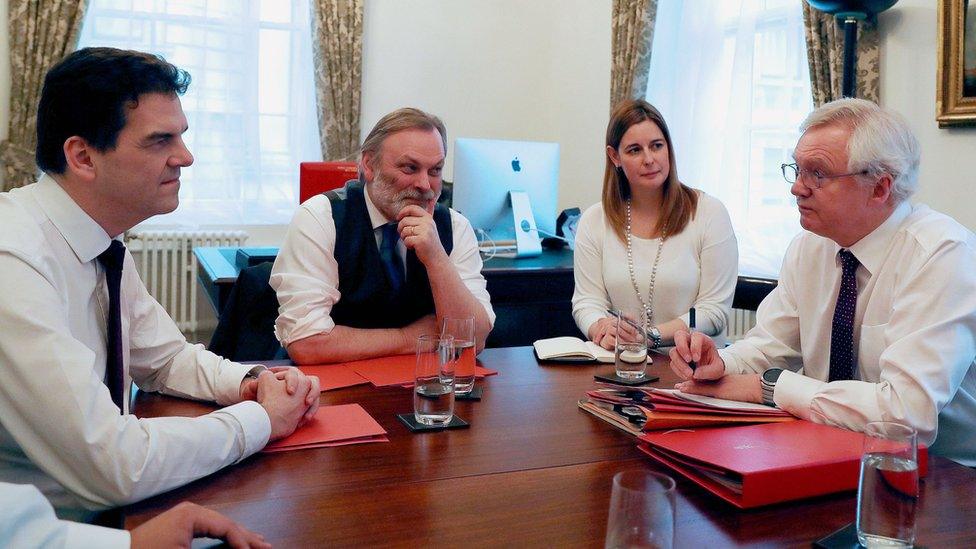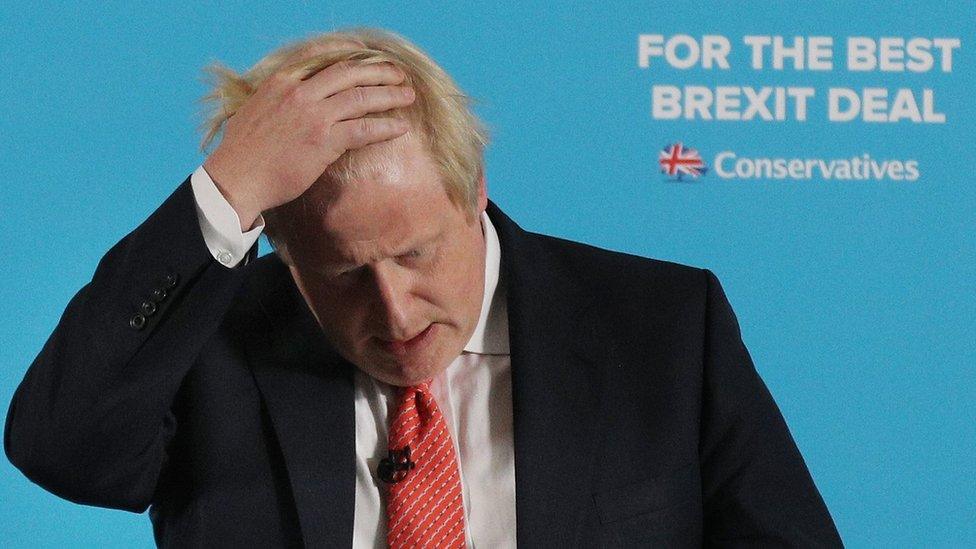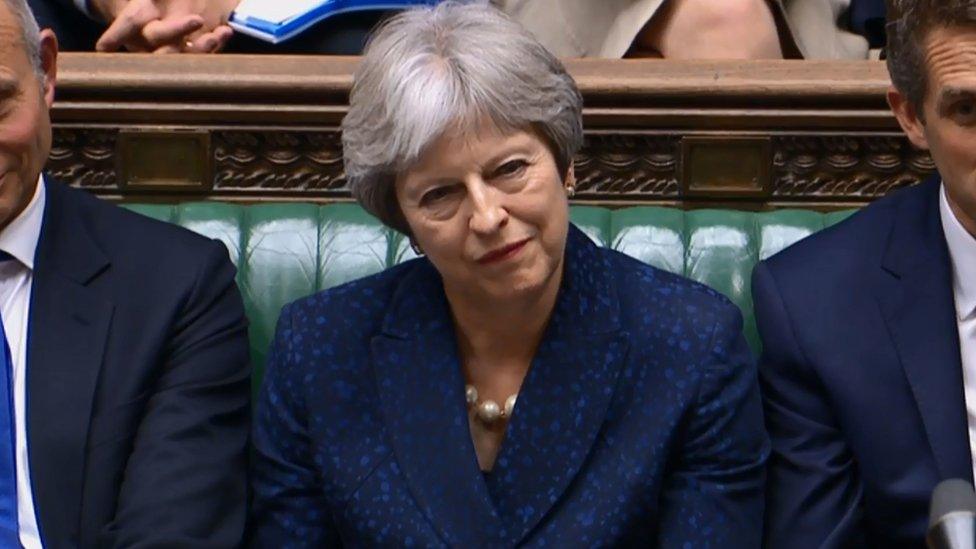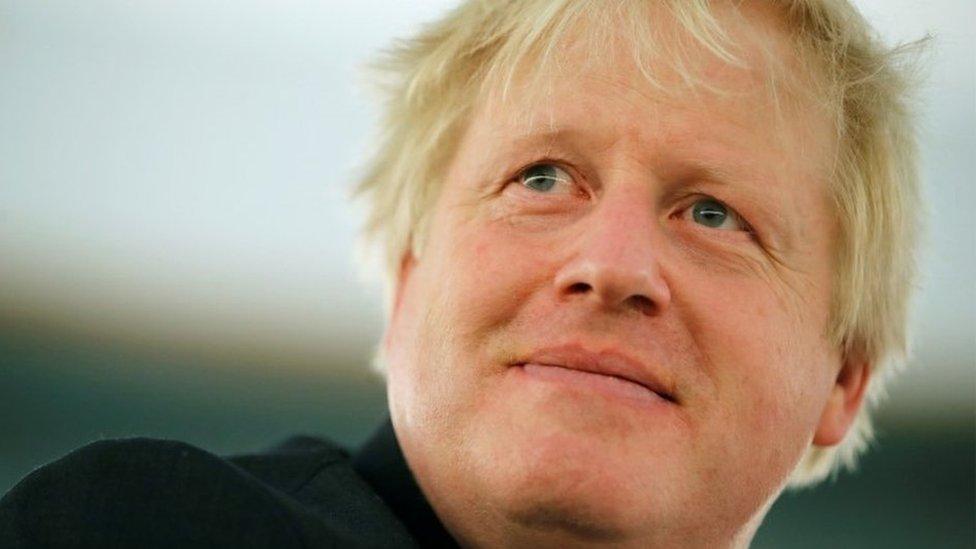Brussels fears UK cabinet crisis may be a path to no-deal Brexit
- Published

Brussels was not worried about David Davis (far right) leaving; the possibility Olly Robbins (far left) might depart was far more concerning
David Davis's resignation was met with a collective shrug of the shoulders in Brussels on Monday. "How can we miss a man who was never here?", one EU source commented to me. The Brexit secretary made one visit to Brussels in the last four months.
A far more familiar face here is Olly Robbins, the prime minister's Europe adviser. The EU is reassured that he's staying in his post - for now. But the mood in Brussels - especially after hearing this afternoon that Boris Johnson too was gone - is far from blasé.
The president of the European Council, Donald Tusk, said Europe was deeply troubled not by British cabinet resignations, but by Brexit itself.
"Politicians come and go," he said. "But the problems they have created for the people remain. The mess caused by Brexit is the biggest problem in the history of EU-UK relations. And it is still very far from being solved."
A sense of unease hangs heavy.
"Theresa May is respected in Europe," one contact told me. "But so many times since this Brexit process began, we've had to ask ourselves: will she stay or will she go? And now here we are again."
Political uncertainty in Britain makes the possibility of a no-deal Brexit seem far more likely in the eyes of Brussels bureaucrats.
Not because either side want it, but because time for EU-UK negotiations - as the European Commission never tires of repeating - is simply running out.

Boris Johnson also stepped down, making the possibility of a no-deal Brexit seem a little closer
And if the prime minister does indeed survive, what then? Most EU sources I spoke to believe she will. One compared the prime minister to Germany's Angela Merkel and said both women were consistently under-estimated.
Listen to Theresa May's impassioned address to Parliament today - promising a return to UK sovereignty after Brexit, yet simultaneously keeping close ties to Europe (no country with an EU association agreement has so far avoided signing up to binding relations), with frictionless trade and a close customs relationship that is not a customs union (honest), while remaining free to strike the UK's own trade deals.
The EU is holding fire for now on her plan.

More from Katya Adler:

Leaders are mindful of not wanting to further weaken Theresa May at home by rushing forward with their manifold objections - but it's just a matter of time.
The next Brexit negotiating round is pencilled in for a week today.
Now, Downing Street believes that the hot water the prime minister is in today will shock EU leaders into realising they need to start compromising themselves - not just perpetually demanding capitulations on the UK's red lines.
Privately, key EU figures admit there will be some give from Brussels - eventually. But how much?
Certainly not what would be needed to make Theresa May's proposed third way for Brexit work as she currently presents it.

Brussels is quietly confident Theresa May will survive this crisis
"On the one hand, it's true what Downing Street says," one EU source told me. "The UK is bigger than Norway and strategically, politically and economically more important to us than Switzerland, yes. But EU countries benefit more from keeping their club - the single market and customs union - intact, than they would do by compromising everything just for the sake of better bilateral relations with the UK after Brexit. You can forget it."
The EU definitely expects more concessions from Theresa May in negotiations if she wants what she describes as a deep and special partnership post Brexit.
But the bottom line in Brussels is: hard or soft, Brexit must be done in time.
Whether Theresa May or another is at the helm in the UK, EU diplomats say they need a leader who has to power to make a deal in Brussels and see it through back home.
Otherwise, they believe a disorderly no-deal Brexit beckons - with all the consequences they think that will have in the UK and across the EU.
- Published9 July 2018
- Published9 July 2018

- Published30 December 2020

- Published7 June 2018
